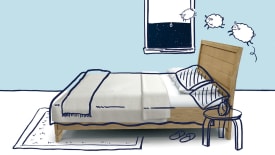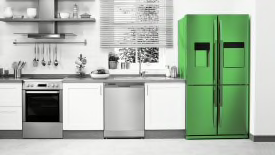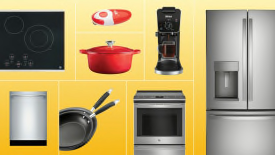What's the strangest thing you've put in the dishwasher? Consumer Reports asked readers to come clean. Car parts and computer keyboards are just some of the things that, apparently, wind up in dishwashers across the country.
The thinking goes something like this: If a dishwasher does a good job cleaning dirty dishes and greasy pots, it must be able to clean other stuff, too. But major manufacturers we spoke to say that putting things in the dishwasher that aren't deemed dishwasher-safe is not a good idea. Doing so can affect the dishwasher, the item—or both.
One reader told us she washes her teen's funky-smelling baseball caps in her dishwasher. Another swears that the dishwasher is the easiest way to clean Crocs but adds that you should put the plastic shoes back on your feet while warm from the dishwasher so that they still fit. (Crocs' website warns that a dishwasher's heat can shrink or warp the shoes.)
And car engine valves? A trip through the dishwasher ruined a set, according to yet another reader.
Here's What Can Ruin Your Dishwasher
"The dishwasher is designed to clean dishes, glasses, silverware, pots, and pans. That's about it," says Larry Ciufo, the engineer who oversees Consumer Reports' dishwasher tests.
"Grease from car parts or machine parts can clog the wash system, and, once clogged, the water can't circulate to clean dishes," Ciufo says. "A partial clog allows the water to circulate. But that also means the grease can recirculate through the system, even winding up on your dishes."
Worse yet, your dishwasher won't last as long. Machinery parts, along with tools used for painting, auto repairs, and gardening, are the most common examples of items placed in the dishwasher that can shorten its life, according to Joseph Spina, a spokesman for Electrolux, which makes Electrolux and Frigidaire dishwashers.
And then there are the less obvious offenders. A plastic container goes into the dishwasher, then melts, and pieces can break off and wind up in the filter, even damaging it. Labels on jars become unglued during a cycle and can clog the wash system, says Jeff Beck, dishwasher product manager for Kenmore.
Here's What Your Dishwasher Can Ruin
Between cycles, a dishwasher's water line can retain food particles, or residue from the detergent or rinse aid. A keyboard put in the dishwasher can end up with bits of food next to the shift key, and a baseball cap may emerge with bleach spots.
For safety's sake, certain plastics shouldn't be washed in a dishwasher. "A dishwasher's heat can cause harmful chemicals such as phthalates and BPA to leach from plastics that contain them," says Don Huber, director of product safety for Consumer Reports. If the manufacturer says the plastic is dishwasher-safe, place it on the top rack—away from the heating element. And don't select cycles that use higher wash or dry temperatures, such as the "sanitize" cycle when washing plastic.
Here's what else can happen when you put odd things in the dishwasher, according to manufacturers and CR experts.
Bras. With no agitation and no tumbling, you can sort of understand why someone might put a bra in the dishwasher. Sort of. It's the detergent that's the rub. Both laundry detergent and dish detergent are too sudsy to use in a dishwasher and can cause it to overflow. Dishwasher detergents, on the other hand, may contain degreasers, bleach, and rinse aids, which aren't ideal for cleaning delicate fabrics. In addition, the heat of the dishwasher may damage the bra, says Carole Crosslin, a spokesperson for HanesBrands, maker of 11 bra brands.
Brass and bronze. High temperatures and detergent can discolor or pit these metals. The same is true for copper and pewter. It's better to wash them by hand with water and a mild detergent.
Cast-iron cookware. Seasoning (the baked-on oil) is the secret to a great cast-iron pan. It helps form a slick surface for cooking and prevents rust. If you clean your cast-iron pan in the dishwasher, it can remove the seasoning, according to Lodge, a maker of cast-iron pans. For everyday cleaning, rinse with water or use a paper towel to wipe your skillet clean.
Computer keyboards. Even if the keys come out clean, water might remain in the keyboard. You may have experienced something similar if you've ever spilled coffee or soda on your keyboard.
Fish. Some folks "cook" salmon, wrapped in foil, in their dishwasher. Manufacturers don't recommend doing that. LG doesn't test its dishwashers for cooking, says Taryn Brucia, a company spokesperson. "There's also the question of whether certain foods (like fish and eggs) will be heated well enough in the dishwasher to kill pathogens like Salmonella," she says. "Water temperature will not be as consistent in a dishwasher as compared to a stove."
Gold leaf. It can be tempting to put a set of your good china with gold-leaf in the dishwasher, especially after hosting a big dinner party. But don't. The gold can discolor or fade.
Insulated mugs. Here's the problem with travel mugs that aren't labeled dishwasher-safe: When you use the normal cycle, the exterior of the mug is exposed to water and high temperatures, which can damage the vacuum seal that exists between the inner and outer layers, LG's Brucia says. "If water gets in that seal, it could affect the mug's ability to retain heat," she says.
Potatoes. It may seem expedient to spread out a 5-pound bag of potatoes on the top rack, but it's better to just rinse the dirt off in the sink. Residual soap and rinse aid in the dishwasher's water line can spritz the spuds, leaving them not so clean after all.
Sharp knives. Even if labeled dishwasher-safe, it's better to wash knives by hand. Sharp knives can become dull after rubbing against other cutlery in the basket.
Wooden items. Wood, water, and heat aren't a great mix, and can result in your wooden cutting board or salad bowls warping and cracking.


















